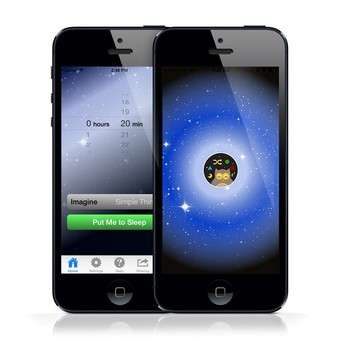New app shuffles thoughts to summon sleep

(Medical Xpress)—If counting sheep can't help you sleep, you could try thinking of an elephant, French toast and scuba diving. Simon Fraser University researcher Luc Beaudoin has created mySleepButton, a first-of-its-kind app that harnesses the power of the imagination to help users nod off.
Distributed by Apple as a free iTunes download, the app incorporates concepts from cognitive science, a multidisciplinary study of the mind and its processes. It works by preventing sleep-interfering thoughts and activating a mechanism that could help trigger sleep.
Based on the "cognitive shuffle" technique developed by Beaudoin, an SFU adjunct education professor, the app works by prompting users to imagine various objects or scenes in rapid succession.
"For example, one moment, users may be directed to think of a baby, then next a football game, then beans, a ball, London and so on," he says.
The method is based on the uniquely incoherent nature of sleep onset "mentation," a term used by Beaudoin that refers to all kinds of mental activity.
"As you fall asleep, you tend to entertain various detached thoughts and images. The app gets users to think in a manner that, like sleep onset, is both visual and random," explains Beaudoin. "In a nutshell, it's a case of 'fake it until you make it.'
"Brain areas involved in controlling sleep detect that sense-making has been suspended. This basically gives them an implicit license to continue the transition to sleep," he says.
Executive functions—brain functions like planning, worrying and problem solving that are vital for helping us make sense of the world during waking hours—can delay sleep when they don't switch off at bed time.
By prompting users to interpret and visualize words, mySleepButton can help deactivate these executive functions.
"While you're thinking about random objects or scenes, you can't think about your mortgage, an important meeting or an impending divorce," says Beaudoin.
"That's because, to a certain extent, we all have one track minds. It's very hard to think about multiple distinct things at the same time."
Beaudoin, an associate member of SFU's cognitive science program, says the app could also help increase cognitive productivity.
"Quality of work decreases when people are sleep-deprived and getting adequate sleep is very important for cognitive performance," he says.
The app has potential applications for industries that employ scientific knowledge workers, such as software and aviation, or for employees on variable schedules who need to be alert, such as transportation workers.
The application is also a valuable research tool for sleep science and cognitive science, says Beaudoin, who authored the book Cognitive Productivity.
Data collected from consenting users could be used in scientific studies or feed directly into further development of the app.
More information: itunes.apple.com/us/app/myslee … ton/id740251957?mt=8

















